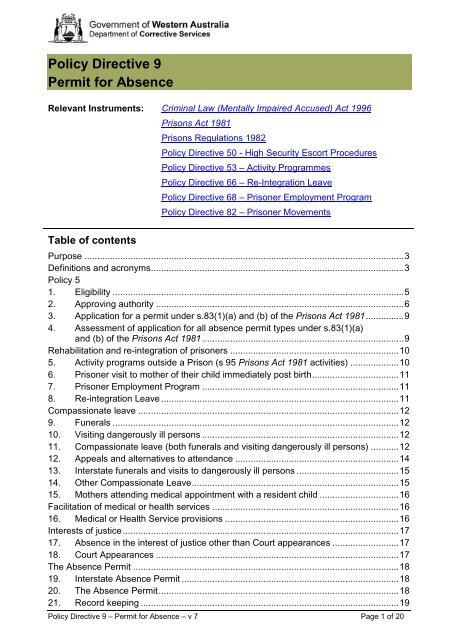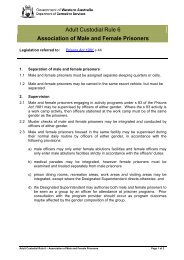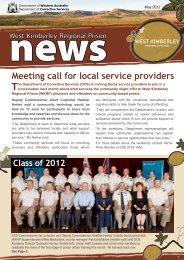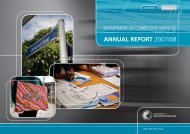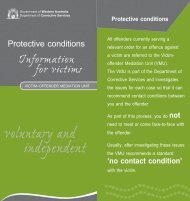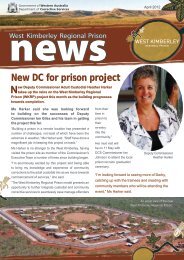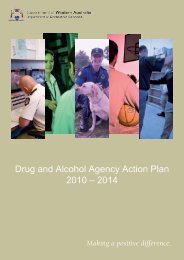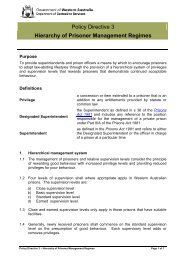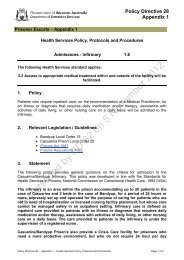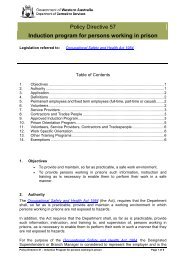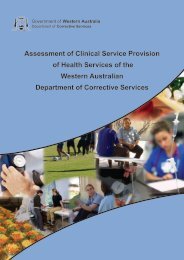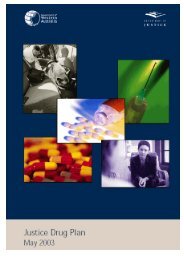Policy Directive 9 - Department of Corrective Services
Policy Directive 9 - Department of Corrective Services
Policy Directive 9 - Department of Corrective Services
Create successful ePaper yourself
Turn your PDF publications into a flip-book with our unique Google optimized e-Paper software.
<strong>Policy</strong> <strong>Directive</strong> 9<br />
Permit for Absence<br />
Relevant Instruments: Criminal Law (Mentally Impaired Accused) Act 1996<br />
Prisons Act 1981<br />
Prisons Regulations 1982<br />
<strong>Policy</strong> <strong>Directive</strong> 50 - High Security Escort Procedures<br />
<strong>Policy</strong> <strong>Directive</strong> 53 – Activity Programmes<br />
<strong>Policy</strong> <strong>Directive</strong> 66 – Re-Integration Leave<br />
<strong>Policy</strong> <strong>Directive</strong> 68 – Prisoner Employment Program<br />
<strong>Policy</strong> <strong>Directive</strong> 82 – Prisoner Movements<br />
Table <strong>of</strong> contents<br />
Purpose ............................................................................................................................. 3<br />
Definitions and acronyms ................................................................................................... 3<br />
<strong>Policy</strong> 5<br />
1. Eligibility .................................................................................................................. 5<br />
2. Approving authority ................................................................................................. 6<br />
3. Application for a permit under s.83(1)(a) and (b) <strong>of</strong> the Prisons Act 1981 ............... 9<br />
4. Assessment <strong>of</strong> application for all absence permit types under s.83(1)(a)<br />
and (b) <strong>of</strong> the Prisons Act 1981 ............................................................................... 9<br />
Rehabilitation and re-integration <strong>of</strong> prisoners .................................................................. 10<br />
5. Activity programs outside a Prison (s 95 Prisons Act 1981 activities) ................... 10<br />
6. Prisoner visit to mother <strong>of</strong> their child immediately post birth .................................. 11<br />
7. Prisoner Employment Program ............................................................................. 11<br />
8. Re-integration Leave ............................................................................................. 11<br />
Compassionate leave ...................................................................................................... 12<br />
9. Funerals ................................................................................................................ 12<br />
10. Visiting dangerously ill persons ............................................................................. 12<br />
11. Compassionate leave (both funerals and visiting dangerously ill persons) ........... 12<br />
12. Appeals and alternatives to attendance ................................................................ 14<br />
13. Interstate funerals and visits to dangerously ill persons ........................................ 15<br />
14. Other Compassionate Leave ................................................................................. 15<br />
15. Mothers attending medical appointment with a resident child ............................... 16<br />
Facilitation <strong>of</strong> medical or health services ......................................................................... 16<br />
16. Medical or Health Service provisions .................................................................... 16<br />
Interests <strong>of</strong> justice ............................................................................................................ 17<br />
17. Absence in the interest <strong>of</strong> justice other than Court appearances .......................... 17<br />
18. Court Appearances ............................................................................................... 17<br />
The Absence Permit ........................................................................................................ 18<br />
19. Interstate Absence Permit ..................................................................................... 18<br />
20. The Absence Permit .............................................................................................. 18<br />
21. Record keeping ..................................................................................................... 19<br />
<strong>Policy</strong> <strong>Directive</strong> 9 – Permit for Absence – v 7 Page 1 <strong>of</strong> 20
22. <strong>Policy</strong> review ......................................................................................................... 19<br />
Applicability ...................................................................................................................... 19<br />
Approved ......................................................................................................................... 19<br />
<strong>Policy</strong> sponsor .................................................................................................................. 19<br />
Contact person ................................................................................................................. 19<br />
Amendment history .......................................................................................................... 20<br />
<strong>Policy</strong> <strong>Directive</strong> 9 – Permit for Absence – v 7 Page 2 <strong>of</strong> 20
Purpose<br />
To permit the absence <strong>of</strong> prisoners from prison for the purposes <strong>of</strong> rehabilitation,<br />
reintegration, attending medical or health appointments, the interest <strong>of</strong> justice and meeting<br />
the compassionate needs <strong>of</strong> prisoners to attend family and cultural significant events.<br />
Definitions and acronyms<br />
Absence Permit<br />
Activity<br />
After Hours<br />
Approving Authority<br />
ARMS<br />
Authorised Assistant<br />
Superintendent<br />
Charge <strong>of</strong><br />
Designated<br />
Superintendent<br />
Employment Related<br />
Activity<br />
ESG<br />
Furthering the<br />
Interests <strong>of</strong> Justice<br />
The document authorising a prisoner to be absent from a<br />
prison. A prisoner with a valid absence permit shall be<br />
deemed to be in lawful custody while absent as authorised by<br />
the permit.<br />
A reference in this policy to an activity, activity programme or<br />
external activity is taken to mean an approved external activity<br />
(Refer to <strong>Policy</strong> <strong>Directive</strong> 53 - Activity Programs).<br />
After 1600 hours and before 0800 hours on weekdays, all<br />
hours on weekends and on public holidays.<br />
The person or group <strong>of</strong> persons to whom the Commissioner<br />
has delegated the authority to approve an absence permit.<br />
At Risk Management System.<br />
The Assistant Superintendent or Manager Assessments (or in<br />
the case <strong>of</strong> privately operated prisons, the relevant Assistant<br />
Director) <strong>of</strong> the prison whose responsibilities include prisoner<br />
management and/or assessments. The Authorised Assistant<br />
Superintendent is authorised by the Designated Superintendent<br />
to undertake the responsibilities as per this policy.<br />
In addition to being responsible for monitoring and recording <strong>of</strong><br />
a prisoner’s movements, the person is required to be in the<br />
physical presence <strong>of</strong> the prisoner and have reasonable control<br />
over him/her. See also ‘supervision’.<br />
Any person designated under s 36(1) <strong>of</strong> the Prisons Act 1981,<br />
by the Chief Executive Officer as Superintendent <strong>of</strong> a prison<br />
who shall have the charge and superintendence <strong>of</strong> the prison<br />
for which he or she is designated and shall be responsible to<br />
the Chief Executive Officer for the good government, good<br />
order and security <strong>of</strong> that prison. Any reference to the<br />
Designated Superintendent in this policy also refers to<br />
Directors <strong>of</strong> Private Prison Facilities only for the purposes <strong>of</strong><br />
undertaking the responsibilities set out in this policy.<br />
Any activity that enhances a prisoner’s prospects <strong>of</strong> gaining<br />
paid employment following release from prison. This includes<br />
education/vocational training, seeking employment, work<br />
experience with an employer, and paid employment.<br />
Emergency Support Group.<br />
To attend a place for the purpose <strong>of</strong> facilitating the<br />
investigation <strong>of</strong> an <strong>of</strong>fence or the administration <strong>of</strong> justice by<br />
state or federal police or other law enforcement agency (Does<br />
not include attendance at a court or other body with judicial<br />
<strong>Policy</strong> <strong>Directive</strong> 9 – Permit for Absence – v 7 Page 3 <strong>of</strong> 20
HSE<br />
Generally<br />
IMP<br />
MAP<br />
Officer in Charge<br />
(OIC)<br />
One Off Absences<br />
PEP<br />
Primary Care Giver<br />
Prison<br />
RIL<br />
Short Courses<br />
Supervision<br />
TOMS (Total Offender<br />
Management Solution)<br />
authority).<br />
High Security Escort – an escort <strong>of</strong> a prisoner on the HSE list<br />
and conducted in accordance with <strong>Policy</strong> <strong>Directive</strong> 50 – High<br />
Security Escorts.<br />
Where the word ‘generally’ is used in any provision in this policy,<br />
it is taken to mean that what is stated in that provision is the<br />
intention, and may only be varied in exceptional circumstances.<br />
Individual Management Plan.<br />
Management and Placement Checklist (Remand or<br />
Sentenced).<br />
Means the <strong>of</strong>ficer in charge <strong>of</strong> the prison as nominated by, and<br />
in the absence <strong>of</strong>, the designated Superintendent.<br />
In certain cases, a prisoner who is not part <strong>of</strong> a structured PEP<br />
may be approved for ‘one <strong>of</strong>f’ absences for employment<br />
related activities under s 95 <strong>of</strong> the Prisons Act 1981 (Refer to<br />
<strong>Policy</strong> <strong>Directive</strong> 53). These include such activities as job<br />
interviews, short courses, driver training, obtaining work<br />
clothing, opening a bank account, registering with a Job<br />
<strong>Services</strong> Australia Provider but do not include paid<br />
employment and work experience.<br />
Prisoner Employment Program.<br />
The main person currently or previously responsible for the<br />
day-to-day care and responsibility for a child either by formal or<br />
informal arrangement.<br />
As defined in s 3 or s 23 <strong>of</strong> the Prisons Act 1981. Any<br />
reference in this policy to a prison includes an external<br />
facility/work camp.<br />
Re-Integration Leave.<br />
A course provided by an education/training provider that does<br />
not exceed a total <strong>of</strong> 4 weeks in duration, and may include fulltime<br />
or part-time attendance.<br />
The monitoring and recording <strong>of</strong> a prisoner’s movements.<br />
Supervision for the purposes <strong>of</strong> approved external activities<br />
may include remote supervision (not required to be in the<br />
physical presence <strong>of</strong> the prisoner). See also ‘in charge’.<br />
An electronic database used by the <strong>Department</strong> <strong>of</strong> <strong>Corrective</strong><br />
<strong>Services</strong> to record and manage comprehensive information<br />
relating to <strong>of</strong>fenders in custody which facilitates their effective<br />
management.<br />
<strong>Policy</strong> <strong>Directive</strong> 9 – Permit for Absence – v 7 Page 4 <strong>of</strong> 20
<strong>Policy</strong><br />
That the assessment <strong>of</strong> and decisions about a prisoner’s absence from prison reflect<br />
modern correctional practices and standards and meet the objectives <strong>of</strong> the absence<br />
permit legislation. The assessment <strong>of</strong> a prisoner’s absence from prison will ensure that<br />
protection for both the community and staff managing those prisoners are paramount<br />
considerations.<br />
1. Eligibility<br />
1.1 To participate in absence permits under s 83(1)(a) <strong>of</strong> the Prisons Act 1981, (see<br />
below table), a prisoner must have achieved a current minimum security rating.<br />
1.2 Prisoners <strong>of</strong> any security rating may be eligible for an absence permit under<br />
s 83(1)(b)(c) and (d) <strong>of</strong> the Prisons Act 1981.<br />
1.3 A prisoner who is subject to the Criminal Law (Mentally Impaired Accused) Act<br />
1996 is only eligible under this policy for an absence permit as per s 32(2) <strong>of</strong> the<br />
Criminal Law (Mentally Impaired Accused) Act 1996 for the purposes <strong>of</strong>:<br />
• the facilitation <strong>of</strong> the provision <strong>of</strong> medical or health services to the accused<br />
or<br />
• the furthering <strong>of</strong> the interests <strong>of</strong> justice.<br />
The prisoner may be eligible for leave under s 28 <strong>of</strong> the Criminal Law (Mentally<br />
Impaired Accused) Act 1996 and where applicable is to be referred to the<br />
Mentally Impaired Accused Review Board for consideration.<br />
<strong>Policy</strong> <strong>Directive</strong> 9 – Permit for Absence – v 7 Page 5 <strong>of</strong> 20
2. Approving authority<br />
The approving authority for an Absence Permit shall depend upon the reason for the absence and the location as indicated in the following table:<br />
Prisons<br />
Act 1981<br />
Reason<br />
Delegated Approval Level –<br />
within WA<br />
Delegated Approval<br />
Level – Interstate (Reg<br />
54O)<br />
83(1)(a)<br />
Rehabilitation<br />
and<br />
Reintegration<br />
(Minimum<br />
security<br />
prisoners only)<br />
Approved external activities<br />
conducted outside <strong>of</strong> a prison ie<br />
Reparation activities,<br />
charitable/volunteer work, work<br />
associated with the operation <strong>of</strong><br />
the prison, religious observance,<br />
recreational activities, short<br />
courses, one-<strong>of</strong>f absences (Refer<br />
to <strong>Policy</strong> <strong>Directive</strong> 53).<br />
Designated Superintendent / Authorised<br />
Assistant Superintendent<br />
Deputy Commissioner<br />
Adult Custodial<br />
Prisoner visit to mother <strong>of</strong> their<br />
child immediately post birth.<br />
Director Sentence Management<br />
Manager Release Planning<br />
Manager Sentence Management<br />
<strong>Department</strong>al Representatives – Prisoners<br />
Review Board.<br />
Assistant Commissioner Custodial <strong>Services</strong><br />
via Sentence Management.<br />
Deputy Commissioner Adult Custodial via<br />
Sentence Management<br />
Not applicable<br />
Prisoner Employment Program. Assistant Commissioner Custodial <strong>Services</strong><br />
This includes all employment<br />
related activities with the Director Sentence Management (nonapprovals).<br />
exception <strong>of</strong> short courses and<br />
‘one <strong>of</strong>f’ absences (Refer to <strong>Policy</strong><br />
<strong>Directive</strong> 68).<br />
Not applicable<br />
<strong>Policy</strong> <strong>Directive</strong> 9 – Permit for Absence – v 7 Page 6 <strong>of</strong> 20
Re-Integration Leave (Refer to<br />
<strong>Policy</strong> <strong>Directive</strong> 66).<br />
Assistant Commissioner Custodial <strong>Services</strong><br />
Director Sentence Management (nonapprovals).<br />
Not applicable<br />
83(1)(b)<br />
Compassionate<br />
or humane<br />
treatment <strong>of</strong><br />
prisoners and<br />
their families<br />
(all security<br />
levels)<br />
Funerals and like activities in<br />
relation to the death <strong>of</strong> a person,<br />
such as memorial services,<br />
viewing the deceased, and<br />
visiting the gravesite.<br />
Visiting dangerously ill family<br />
members and significant persons.<br />
For non-HSE prisoners:<br />
Director Sentence Management<br />
Manager Release Planning<br />
Manager Sentence Management<br />
<strong>Department</strong>al Representatives – Prisoners<br />
Review Board<br />
Assistant Commissioner Custodial <strong>Services</strong><br />
via Sentence Management.<br />
Deputy Commissioner Adult Custodial via<br />
Sentence Management.<br />
Not applicable<br />
For HSE Prisoners:<br />
Superintendent Administration in<br />
consultation with the Director, Security<br />
<strong>Services</strong> via Sentence Management.<br />
Not Applicable<br />
All After Hours approvals: Superintendent<br />
Administration.<br />
Not applicable<br />
83(1)(b)<br />
Compassionate<br />
or humane<br />
treatment <strong>of</strong><br />
prisoners and<br />
their families<br />
(all security<br />
levels)<br />
Mother/Primary Carer to attend a<br />
medical appointment with a<br />
resident child.<br />
For non-HSE and fixed term sentenced<br />
prisoners: Designated Superintendent.<br />
For HSE Prisoners and Life/Indefinite<br />
sentenced prisoners:<br />
Superintendent Administration in<br />
consultation with the Director Security<br />
<strong>Services</strong>.<br />
Not applicable<br />
Not applicable<br />
<strong>Policy</strong> <strong>Directive</strong> 9 – Permit for Absence – v 7 Page 7 <strong>of</strong> 20
All After Hours approvals:<br />
Superintendent Administration<br />
Not applicable<br />
Other Compassionate Leave ie<br />
exceptional compassionate<br />
circumstances that do not fit the<br />
criteria under 83(1)(b).<br />
Commissioner via Sentence Management<br />
Commissioner via<br />
Sentence Management<br />
83(1)(c)<br />
The facilitation<br />
<strong>of</strong> the provision<br />
<strong>of</strong> medical or<br />
health services<br />
to prisoners (all<br />
security levels)<br />
Medical appointments; dental;<br />
hearing; optical; other ancillary<br />
health.<br />
For non-HSE prisoners: Designated<br />
Superintendent / Authorised Assistant<br />
Superintendent (in the absence <strong>of</strong> the<br />
Designated Superintendent)<br />
After Hours for non-HSE prisoners: OIC<br />
Commissioner<br />
For HSE prisoners: Designated<br />
Superintendent / Authorised Assistant<br />
Superintendent (in the absence <strong>of</strong> the<br />
Designated Superintendent) plus notification<br />
in line with PD 82: Prisoner Movements and<br />
notification to the ESG as a matter <strong>of</strong><br />
priority.<br />
After hours for HSE Prisoners: OIC plus<br />
notification in line with PD 82: Prisoner<br />
Movements and notification to the ESG as a<br />
matter <strong>of</strong> priority.<br />
83(1)(d)<br />
The furthering <strong>of</strong><br />
interest <strong>of</strong><br />
Justice other<br />
than Court<br />
appearances (all<br />
security levels)<br />
Attending a place for the purpose<br />
<strong>of</strong> a criminal investigation,<br />
providing assistance to police or<br />
other law enforcement agency.<br />
Assistant Commissioner Custodial<br />
Operations<br />
Deputy Commissioner<br />
Adult Custodial<br />
<strong>Policy</strong> <strong>Directive</strong> 9 – Permit for Absence – v 7 Page 8 <strong>of</strong> 20
3. Application for a permit under s.83(1)(a) and (b) <strong>of</strong> the Prisons Act 1981<br />
3.1 A prison staff member will assist the prisoner with the application process,<br />
including writing the application if necessary.<br />
3.2 The prisoner’s application should provide full details including the purpose,<br />
circumstances, period <strong>of</strong> leave required and any other relevant information.<br />
3.3 Where a written application is required, prisoners should make an application<br />
through an Application for Review (C164), PEP application form or Re-integration<br />
Leave application form. However, this does not preclude a prisoner making an<br />
application through a letter addressed to the Designated Superintendent.<br />
4. Assessment <strong>of</strong> application for all absence permit types under s.83(1)(a) and<br />
(b) <strong>of</strong> the Prisons Act 1981<br />
4.1 If a prisoner meets the eligibility requirements to apply for the absence permit, the<br />
Authorised Assistant Superintendent shall request an <strong>of</strong>ficer to commence<br />
assessing the application including risk and security considerations which may<br />
include completing a relevant Checklist. The assessment may also include an<br />
evaluation <strong>of</strong> costs, transport arrangements, supervision requirements, validity<br />
and justification <strong>of</strong> the absence.<br />
4.2 The assessing <strong>of</strong>ficer shall also check all applications for the existence <strong>of</strong> victim<br />
issues and where a prisoner applying for an absence permit has conditions<br />
pertaining to victims, ensure that the conditions are stipulated in the application.<br />
4.2.1 Where a prisoner has applied for participation in Re-integration Leave, the PEP<br />
and/or Compassionate Leave, the Authorised Assistant Superintendent shall<br />
inform the Victim Notification Register <strong>of</strong> the application.<br />
4.2.2 Where a referral has been made to the Victim-<strong>of</strong>fender Mediation Unit (VMU) and<br />
a report has not been finalised, the Authorised Assistant Superintendent shall<br />
inform the VMU <strong>of</strong> the prisoner’s application for Re-integration Leave and/or the<br />
PEP.<br />
4.3 In making a recommendation or decision regarding an application for an Absence<br />
Permit, <strong>of</strong>ficers, Superintendents and approving authorities shall consider and<br />
address in their recommendations/decisions, issues dealing with:<br />
• Risk to the safety <strong>of</strong> the public<br />
• Likelihood <strong>of</strong> successfully completing the absence<br />
• Behaviour whilst in custody<br />
• A prisoner’s listing as a Special Pr<strong>of</strong>ile Offender.<br />
4.4 In determining the risk to the safety <strong>of</strong> the public, <strong>of</strong>ficers, Superintendents and<br />
approving authorities shall consider the following factors that may affect<br />
conditions or restrictions placed on the absence:<br />
• The prisoner’s escape history<br />
• The prisoner’s <strong>of</strong>fence history including the nature and seriousness <strong>of</strong><br />
<strong>of</strong>fences and pattern <strong>of</strong> <strong>of</strong>fending behaviour<br />
• The outcome (including cancellation) <strong>of</strong> any previous absence permits<br />
granted to the prisoner<br />
• The prisoner’s prison charge history and any prison management reports<br />
• The interests <strong>of</strong> the victim and the existence and effect <strong>of</strong> any restraining<br />
order/other court orders.<br />
<strong>Policy</strong> <strong>Directive</strong> 9 – Permit for Absence – v 7 Page 9 <strong>of</strong> 20
4.5 The Designated Superintendent shall not permit prisoners identified as being the<br />
respondent in a Restraining Order to engage in any activity outside the prison<br />
that may lead to a breach <strong>of</strong> the conditions <strong>of</strong> the order.<br />
4.6 Where other than the Designated Superintendent / Authorised Assistant<br />
Superintendent is the approving authority, the Authorised Assistant<br />
Superintendent shall forward the application with any reports prepared in<br />
assessing the application and a recommendation to the approving authority<br />
unless otherwise indicated.<br />
Rehabilitation and re-integration <strong>of</strong> prisoners<br />
(S 83(1)(a) Prisons Act 1981)<br />
5. Activity programs outside a Prison (s 95 Prisons Act 1981 activities)<br />
5.1 The Deputy Commissioner Adult Custodial shall approve activities that may take<br />
place outside a prison under s 95 <strong>of</strong> the Prisons Act 1981 (Refer <strong>Policy</strong> <strong>Directive</strong><br />
53 - Activity Programs). It is intended that the approved activities will largely fall<br />
within paragraphs (d), (f) and (g) <strong>of</strong> r 54D <strong>of</strong> the Prisons Regulations 1982, but<br />
may include activities that fall within (a),(b),(c),(e),(h) and (i).<br />
5.2 In relation to employment related activities, only short courses or ‘one-<strong>of</strong>f’<br />
absences shall be considered as an activity program outside a prison (Refer to<br />
<strong>Policy</strong> <strong>Directive</strong> 68 - Prisoner Employment Program for further clarification).<br />
5.3 An Absence Permit for the purpose <strong>of</strong> engaging in an activity program outside a<br />
prison may provide for more than one (1) absence but each absence shall not<br />
exceed 12 hours. However, consecutive permits that result in overnight stays<br />
may be made.<br />
5.4 Accommodation for the overnight stay must be approved by the Commissioner or<br />
delegate. The Deputy Commissioner Adult Custodial may, when approving an<br />
External Activity, at the same time approve the location as suitable to<br />
accommodate prisoners on overnight stays. Where an existing approved activity<br />
is subsequently proposed for overnight stays, the Designated Superintendent<br />
may approve the location for overnight stays providing it meets the following<br />
criteria:<br />
• Daily transport to and from the prison/work camp is impractical or inefficient<br />
• Adequate accommodation facilities are available<br />
• Adequate logistic support and supervision is available.<br />
Note: Where the approval is granted the Designated Superintendent is to be satisfied<br />
that the approval does not increase the risk to the community.<br />
5.5 A prison <strong>of</strong>ficer shall have charge <strong>of</strong> a remand (only) status prisoner whilst that<br />
prisoner is absent from a prison on an approved activity.<br />
5.6 No prisoner is to proceed on a s 95 Prisons Act 1981 External Activity unless a<br />
Suitability for External Activities Checklist and a formal assessment (MAP and/or<br />
IMP) has been completed. Minimum security prisoners may, at the discretion <strong>of</strong><br />
the Designated Superintendent, be placed at either the Warburton or Wyndham<br />
Work Camps in anticipation <strong>of</strong> a Suitability for External Activities Checklist and a<br />
MAP or IMP (where applicable) being completed, but may not participate in any<br />
activity outside the work camp until such time as both documents have been<br />
completed.<br />
<strong>Policy</strong> <strong>Directive</strong> 9 – Permit for Absence – v 7 Page 10 <strong>of</strong> 20
5.7 Where the reason for an absence permit relates to activities referred to in section<br />
5.1, the Designated Superintendent may determine that prisoners shall not need<br />
to make application.<br />
5.8 The Designated Superintendent shall appoint an <strong>of</strong>ficer to assess the suitability <strong>of</strong><br />
selected minimum-security prisoners for participation in external activities<br />
referred to in section 5.1. That <strong>of</strong>ficer shall assess prisoners through the prison<br />
initiated “Suitability for External Activities or Work Camp Programme” checklist as<br />
soon as practicable after they arrive at the prison or achieve a minimum rating<br />
and shall make recommendation to the Authorised Assistant Superintendent.<br />
5.9 The <strong>of</strong>ficer responsible for assessing the suitability <strong>of</strong> prisoners to participate in<br />
activity programmes outside the prison shall, where a prisoner’s circumstances<br />
alter, undertake a review <strong>of</strong> that suitability.<br />
5.10 The Authorised Assistant Superintendent shall record their decision on TOMS in<br />
“External Activities Suitability” and advise the prisoner.<br />
5.11 The Authorised Assistant Superintendent shall record any restriction or conditions<br />
applicable to the prisoner on TOMS in “External Activities”.<br />
6. Prisoner visit to mother <strong>of</strong> their child immediately post birth<br />
6.1 Only minimum security prisoners are eligible to apply to visit the mother <strong>of</strong> their<br />
child immediately after the birth <strong>of</strong> the prisoner’s child.<br />
6.2 The cost limitations outlined in Appendix 1 also apply to a prisoner visiting the<br />
mother <strong>of</strong> their child immediately post birth.<br />
7. Prisoner Employment Program<br />
Refer to <strong>Policy</strong> <strong>Directive</strong> 68 - Prisoner Employment Program for application, assessment<br />
and approval process.<br />
8. Re-integration Leave<br />
Refer to <strong>Policy</strong> <strong>Directive</strong> 66 - Re-Integration Leave for application, assessment and<br />
approval process.<br />
<strong>Policy</strong> <strong>Directive</strong> 9 – Permit for Absence – v 7 Page 11 <strong>of</strong> 20
Compassionate leave<br />
(s 83(1)(b) Prisons Act 1981)<br />
9. Funerals<br />
9.1 Funerals shall include other like activities in relation to the death <strong>of</strong> a person,<br />
such as memorial services, viewing the deceased and visiting the gravesite.<br />
9.2 Generally, a prisoner will not be approved to attend a viewing unless that prisoner<br />
is unable to attend other funeral like activities.<br />
9.3 When the prison first becomes aware <strong>of</strong> a potential application for a prisoner to<br />
attend a funeral they are to enter the details in the Funeral Register on TOMS<br />
and commence the relevant Checklist.<br />
10. Visiting dangerously ill persons<br />
10.1 A person is considered dangerously ill where medical advice indicates that their<br />
illness or injury is life threatening and that death is imminent.<br />
10.2 When the prison first becomes aware <strong>of</strong> a potential application for a prisoner to<br />
visit a dangerously ill person they are to email the AC-SM-Funerals distribution<br />
group to advise them <strong>of</strong> the impending application along with the dangerously ill<br />
person’s name, location <strong>of</strong> the dangerously ill person, proposed time and date to<br />
visit (if known) and the prisoner’s name requesting to attend.<br />
10.3 The prison should ensure the details for the application to visit a dangerously ill<br />
person are entered into the relevant Checklist.<br />
10.4 After hours applications may be approved by the Superintendent Administration<br />
who will inform the relevant OIC <strong>of</strong> the decision in writing. If after hours, the<br />
prison is to initially contact the Adult Custodial Operations Duty Manager who will<br />
inform the Superintendent Administration <strong>of</strong> the application. The Superintendent<br />
Administration will then provide all documentation to Sentence Management for<br />
processing the next working day.<br />
10.5 Generally, only a single visit will be approved to visit a dangerously ill person.<br />
11. Compassionate leave (both funerals and visiting dangerously ill persons)<br />
11.1 The <strong>Department</strong> has financial and security limitations in relation to a prisoner’s<br />
attendance at a funeral or visit to a dangerously ill person. The limitations are<br />
prescribed in Appendix 1.<br />
11.2 Generally, where an application is found to be within the limitations prescribed in<br />
Appendix 1, only immediate family relationships will be considered favourably.<br />
Exceptional relationships may also be considered favourably where it is a primary<br />
care giver relationship.<br />
11.3 The Designated Superintendent <strong>of</strong> the prison at which the prisoner makes an<br />
application to attend a funeral or visit a dangerously ill person, shall have<br />
responsibility for ensuring that an <strong>of</strong>ficer records and verifies information given by<br />
the prisoner.<br />
11.4 While completing the relevant checklist, <strong>of</strong>ficers shall consider the type <strong>of</strong> the<br />
relationship between the prisoner and the deceased / dangerously ill person.<br />
Officers should only recommend attendance if the deceased or dangerously ill<br />
person is an immediate family member or if the Officer considers the relationship<br />
to be exceptional (ie primary care giver).<br />
<strong>Policy</strong> <strong>Directive</strong> 9 – Permit for Absence – v 7 Page 12 <strong>of</strong> 20
11.4.1 Immediate family includes Biological/legal mother, father, sister, brother, son,<br />
daughter, grandparent or current husband, wife or de-facto partner <strong>of</strong> the<br />
prisoner. It does not include nephew / niece, cousin, uncle / aunt, grandchild,<br />
great grandparent, in-law or other extended family.<br />
11.4.2 Exceptional relationship is generally limited to a primary care giver relationship<br />
only. Only the Assistant Commissioner Custodial <strong>Services</strong> or a higher approving<br />
authority can approve an absence permit for this type <strong>of</strong> relationship after<br />
recommendation by Sentence Management.<br />
11.5 In assessing the application and formulating a recommendation, the Designated<br />
Superintendent shall ensure an <strong>of</strong>ficer has obtained and documented all details<br />
available from external parties as required, including:<br />
• establishing the validity or importance <strong>of</strong> the stated relationship<br />
• any victim issues including whether the victim was known to the prisoner and<br />
if so, whether they are likely to be attending<br />
• any security considerations<br />
11.6 Where a prisoner intends on applying for a permit to attend a funeral or visit a<br />
dangerously ill person and the prisoner has an immediate family relationship or<br />
exceptional relationship, the Authorised Assistant Superintendent shall make<br />
arrangements for the prisoner’s temporary transfer to the prison closest to the<br />
planned activity. This does not include prison-to-prison transfers in the<br />
metropolitan area.<br />
11.6.1 The Authorised Assistant Superintendent shall ensure that the receiving prison is<br />
advised <strong>of</strong> the reason for transfer and provide all relevant information available at<br />
that time, to the receiving prison.<br />
11.6.2 The prisoner is to be advised that, at this stage, their application is still being<br />
considered and may or may not be approved.<br />
11.7 Where a prisoner has applied to visit a dangerously ill person or attend a funeral<br />
like activity in a residential property, Sentence Management shall request the<br />
Director Security <strong>Services</strong> to provide a recommendation in relation to the<br />
application with regard to the personal safety <strong>of</strong> the community, prisoner and/or<br />
staff.<br />
11.8 All applications from High Security Escort prisoners recommended by Sentence<br />
Management are to be referred to the Superintendent Administration for approval<br />
in consultation with the Director, Security <strong>Services</strong>.<br />
11.9 After hours applications are to be referred by the Officer in Charge to the<br />
Superintendent Administration via the on-call Adult Custodial Operations Duty<br />
Manager. The Superintendent Administration will forward notification <strong>of</strong> the<br />
decision to the Officer in Charge via the on-call Adult Custodial Operations Duty<br />
Manager. In cases <strong>of</strong> after hours decisions the Superintendent Administration will<br />
provide all documentation to Sentence Management for processing on the next<br />
working day.<br />
11.10 For all other prisoners, Sentence Management, the Assistant Commissioner<br />
Custodial <strong>Services</strong>, and the Deputy Commissioner Adult Custodial may approve<br />
absence permits for the prisoners to attend funerals or a visit to a dangerously ill<br />
person.<br />
<strong>Policy</strong> <strong>Directive</strong> 9 – Permit for Absence – v 7 Page 13 <strong>of</strong> 20
11.11 The Sentence Management Directorate will advise the Authorised Assistant<br />
Superintendent <strong>of</strong> the decision.<br />
11.11.1 The Authorised Assistant Superintendent shall immediately, upon notification <strong>of</strong><br />
the outcome <strong>of</strong> the application, instruct an <strong>of</strong>ficer to advise the prisoner verbally<br />
<strong>of</strong> the decision and reasons for the decision. The <strong>of</strong>ficer is to enter an ‘Offender<br />
Note’ stating that the prisoner has been advised and the prisoner’s reaction to the<br />
decision. If the application is not approved, the <strong>of</strong>ficer shall also advise the<br />
prisoner <strong>of</strong> the appeals process.<br />
11.11.2 Upon notification <strong>of</strong> the approval <strong>of</strong> an application, the Authorised Assistant<br />
Superintendent shall instruct an <strong>of</strong>ficer to effect the necessary escort and<br />
transport arrangements and complete an Absence Permit and the Transfer and<br />
Discharge Sheet in TOMS.<br />
11.11.3 Prison management is responsible for determining what level <strong>of</strong> operational<br />
security should apply to the prisoner to facilitate attendance at a funeral or visit to<br />
a dangerous ill person. Minimum requirements are defined in <strong>Policy</strong> <strong>Directive</strong> 82<br />
– Prisoner Movements.<br />
11.12 If the prisoner decides to withdraw their application for attendance at a funeral the<br />
prison is to arrange for the prisoner to sign a Withdrawal <strong>of</strong> Application to Attend<br />
Funeral - Appendix 3. The prison will then forward a copy <strong>of</strong> the written<br />
withdrawal to Sentence Management.<br />
12. Appeals and alternatives to attendance<br />
12.1 A prisoner has the right to one (1) appeal only against a decision relating to<br />
attendance at a funeral or visit to a dangerously ill person.<br />
12.2 Prisoners are ineligible to appeal decisions made by the Commissioner.<br />
12.3 If the prisoner wishes to appeal the decision, they are to be provided with and<br />
assisted to complete (if required) the Appeal – Funeral attendance / visit to<br />
dangerously ill person – Appendix 2. Prisoners are to provide further information<br />
addressing the reason for non-approval to prison staff. Prison staff shall then<br />
forward the new information to Sentence Management by way <strong>of</strong> an email or fax.<br />
12.3.1 Any additional information received from family and/or community members is to<br />
be supplied in writing to the prison facility and sent via fax to Sentence<br />
Management by prison staff. This information will only be considered in the event<br />
the prisoner has decided to appeal a decision.<br />
12.3.2 Once the additional information has been received by Sentence Management in<br />
writing, the application will be re-assessed.<br />
12.3.3 Appeals will be considered by the next higher level <strong>of</strong> delegated authority from<br />
the decision maker in relation to the initial application.<br />
12.3.4 The Authorised Assistant Superintendent (or delegate) will be advised <strong>of</strong> the<br />
appeal outcome. Upon notification <strong>of</strong> the outcome <strong>of</strong> the appeal, the Authorised<br />
Assistant Superintendent shall instruct an <strong>of</strong>ficer to advise the prisoner verbally <strong>of</strong><br />
the decision and record this in ‘Offender Notes’. If the appeal is dismissed the<br />
<strong>of</strong>ficer shall also record the response or reaction from the prisoner.<br />
12.3.5 Prison <strong>of</strong>ficers are not to refer prisoners’ families to Sentence Management to<br />
discuss funeral/visit to dangerously ill person applications.<br />
<strong>Policy</strong> <strong>Directive</strong> 9 – Permit for Absence – v 7 Page 14 <strong>of</strong> 20
12.4 Where a prisoner has not been approved to attend a funeral / visit a dangerously<br />
ill person the alternatives to attendance include the following:<br />
12.4.1 Having the prisoner transferred to the nearest prison for visits with family and<br />
community members.<br />
12.4.2 Memorial services to be conducted within the prison.<br />
12.4.3 Flexibility <strong>of</strong> visiting arrangements with family during this time.<br />
12.4.4 Assisting the prisoner to write something to be read out at the funeral.<br />
12.4.5 Video-link with family members before, during and/or after a funeral.<br />
12.4.6 Facilitation <strong>of</strong> telephone calls with family members or other significant support<br />
persons.<br />
12.4.7 Playback <strong>of</strong> a recording <strong>of</strong> a funeral; and/or<br />
12.4.8 Any other culturally appropriate activity that the Authorised Assistant<br />
Superintendent deems suitable.<br />
12.5 The Authorised Assistant Superintendent should consider <strong>of</strong>fering at least one (1)<br />
<strong>of</strong> the options under section 12.4 should a prisoner’s application not be approved.<br />
These options should be considered regardless <strong>of</strong> the reason for not approving<br />
an application.<br />
12.6 Some prisoners may suffer adverse emotional reactions if not approved to attend<br />
funerals in person. In line with the ARMS Manual, prison staff should be vigilant<br />
for the impact <strong>of</strong> a denial to attend a funeral / visit a dangerously ill person and<br />
make an ARMS referral if there are any concerns regarding risk <strong>of</strong> self harm or<br />
suicide. In addition, liaison with the Aboriginal Visitors Scheme, Peer Support<br />
and/or Prison Counselling <strong>Services</strong> should occur where applicable if staff have<br />
concerns about prisoners’ reactions.<br />
13. Interstate funerals and visits to dangerously ill persons<br />
13.1 Prisoners are ineligible to apply for attendance to a funeral occurring interstate or<br />
visit to a dangerously ill person located interstate.<br />
14. Other Compassionate Leave<br />
14.1 Other compassionate leave, which cannot be classified as a funeral or visit to a<br />
dangerously ill person, can be considered under this section.<br />
14.2 Other compassionate leave will only be considered in exceptional circumstances.<br />
14.3 Applications will be considered where an event or situation is causing grave<br />
difficulty or extreme stress to the prisoner or to a person with a significant<br />
relationship to the prisoner.<br />
14.4 Sentence Management may not approve the application or choose to<br />
recommend the application to the Commissioner for consideration. Approval <strong>of</strong><br />
other compassionate leave can only be determined by the Commissioner. There<br />
is no right <strong>of</strong> appeal to the Commissioner’s decision.<br />
14.5 Other compassionate leave shall not include birthdays, reunions, award<br />
ceremonies and weddings/receptions. Prisoners are ineligible to apply for these<br />
events<br />
<strong>Policy</strong> <strong>Directive</strong> 9 – Permit for Absence – v 7 Page 15 <strong>of</strong> 20
15. Mothers attending medical appointment with a resident child<br />
15.1 Mothers with resident children may be approved, under an absence permit, to<br />
accompany a resident child who has an external medical appointment.<br />
15.2 All requests for approvals by prisoners who are subject to High Security Escort<br />
requirements or who are serving a life/indefinite sentence are to be referred to<br />
the Superintendent Administration for consultation with the Director, Security<br />
<strong>Services</strong>. The Superintendent Administration will forward notification <strong>of</strong> an<br />
approval (or otherwise) to the Designated Superintendent. The Superintendent<br />
Administration is available after hours through the Adult Custodial Operations<br />
Duty Manager.<br />
15.3 For all other prisoners, the Designated Superintendent may approve an absence<br />
under this section.<br />
15.4 Prisoner mothers who have an approved Care Plan may be approved for an<br />
absence permit under this section, without the need for a checklist to be<br />
completed.<br />
15.5 Normal security considerations apply to the absence, including escort and<br />
restraint provisions as per <strong>Policy</strong> <strong>Directive</strong> 82 – Prisoner Movements.<br />
15.6 The approval is to be recorded on the Transfer and Discharge Sheet in TOMS.<br />
15.7 The Authorised Assistant Superintendent shall instruct <strong>of</strong>ficers to advise the<br />
prisoner verbally <strong>of</strong> the decision and record the notification in the prisoner’s Unit<br />
file and ‘Offender Notes’.<br />
Facilitation <strong>of</strong> medical or health services<br />
(s 83(1)(c) Prisons Act 1981)<br />
16. Medical or Health Service provisions<br />
16.1 The Designated Superintendent, or in the absence <strong>of</strong> the Designated<br />
Superintendent, the Authorised Assistant Superintendent (or after hours, the OIC)<br />
may approve Absence Permits for prisoners to attend medical, dental, hearing,<br />
optical or other ancillary health appointments for assessment or treatment. The<br />
prisoner is not required to make an application.<br />
16.2 Prisoners may only attend medical appointments as arranged by the<br />
<strong>Department</strong>’s Health <strong>Services</strong>.<br />
16.3 The <strong>Department</strong>’s Health <strong>Services</strong> shall provide the Designated Superintendent<br />
with relevant details, when a prisoner needs to attend a medical or health<br />
appointment outside the prison.<br />
16.4 The Designated Superintendent shall approve the removal <strong>of</strong> the prisoner and<br />
provide in writing any conditions or restriction required to maintain the safe<br />
custody <strong>of</strong> the prisoner during the absence.<br />
16.5 In the event that prison <strong>of</strong>ficers are to undertake the escort, the Authorised<br />
Assistant Superintendent shall instruct an <strong>of</strong>ficer to undertake a risk assessment,<br />
identify any potential issues and make recommendations regarding security and<br />
escort arrangements in accordance with <strong>Policy</strong> <strong>Directive</strong> 82 – Prisoner Movements.<br />
A Checklist is not required.<br />
16.6 In the case <strong>of</strong> a prisoner being admitted to hospital for a life threatening illness /<br />
injury, the OIC shall inform the Superintendent Administration immediately.<br />
Notification to the prisoner’s next <strong>of</strong> kin is to be conducted in accordance with<br />
section 22 <strong>Policy</strong> <strong>Directive</strong> 82 – Prisoner Movements.<br />
<strong>Policy</strong> <strong>Directive</strong> 9 – Permit for Absence – v 7 Page 16 <strong>of</strong> 20
16.7 For HSE Prisoners refer to <strong>Policy</strong> <strong>Directive</strong> 82 – Prisoner Movements.<br />
Interests <strong>of</strong> justice<br />
(s 83(1)(d) Prisons Act 1981)<br />
17. Absence in the interest <strong>of</strong> justice other than Court appearances<br />
17.1 The Assistant Commissioner Custodial Operations may permit a prisoner to be<br />
absent from prison for the purpose <strong>of</strong> furthering the interest <strong>of</strong> justice, where the<br />
<strong>Department</strong> receives a written request for a particular prisoner to attend a<br />
particular place, at a particular time for a reason given. Where the prisoner has<br />
initiated the request, he/she is to lodge a written application.<br />
17.2 The Assistant Commissioner Custodial Operations, before granting an absence<br />
permit for the purpose <strong>of</strong> furthering the interest <strong>of</strong> justice, shall satisfy themselves<br />
about the following matters:<br />
• that the requirement for the prisoner’s presence is bona fide;<br />
• the identity <strong>of</strong> the person and the organisation making the request is<br />
confirmed; and<br />
• that the date, time and place requested are correct.<br />
(A Checklist is not required)<br />
17.3 The Assistant Commissioner Custodial Operations shall record the details <strong>of</strong> the<br />
person making the request on the permit and sign the permit before forwarding a<br />
copy <strong>of</strong> the permit to the Designated Superintendent <strong>of</strong> the prison where the<br />
prisoner is in custody.<br />
17.4 The permit shall be consistent with the requirements as outlined in Part VIII <strong>of</strong> the<br />
Prisons Act 1981 and Division 9 <strong>of</strong> the Prisons Regulations 1982.<br />
17.5 The Designated Superintendent shall execute the instructions within the permit.<br />
17.6 Following the execution <strong>of</strong> the permit, the Designated Superintendent shall<br />
ensure a copy <strong>of</strong> the permit is forwarded to the Offender Records Branch for<br />
placement on the Offender Record file.<br />
17.7 Where the escort is not provided by the external agency making the request (ie<br />
WA Police, Australian Federal Police or Corruption and Crime Commission), the<br />
<strong>Department</strong> may undertake the escort in line with <strong>Policy</strong> <strong>Directive</strong> 82 – Prisoner<br />
Movements and <strong>Policy</strong> <strong>Directive</strong> 50 – High Security Escort Procedures (where<br />
applicable).<br />
18. Court Appearances<br />
18.1 Attendance at Court does not require an absence permit and is progressed by an<br />
order issued by the Court under s 85(1) <strong>of</strong> the Prisons Act 1981 or by the<br />
Designated Superintendent under r 54V <strong>of</strong> the Prisons Regulations 1982.<br />
Where a Subpoena and Order for Production is issued by an interstate Court under the<br />
Service and Execution <strong>of</strong> Process Act 1992 (Cth), an order under s 85 or absence permit<br />
under s 83 <strong>of</strong> the Prisons Act 1981 is not required.<br />
<strong>Policy</strong> <strong>Directive</strong> 9 – Permit for Absence – v 7 Page 17 <strong>of</strong> 20
The Absence Permit<br />
19. Interstate Absence Permit<br />
19.1 Interstate Absence Permits may only be approved by the Deputy Commissioner<br />
Adult Custodial or Commissioner, in accordance with the table at section 2 –<br />
Approving Authority.<br />
19.2 If the absence permit is in relation to an approved external activity under s<br />
83(1)(a) <strong>of</strong> the Prisons Act 1981 that involves a cross-border activity, approval<br />
may be granted by the Deputy Commissioner Adult Custodial.<br />
19.3 Otherwise, the Deputy Commissioner Adult Custodial shall not permit a prisoner<br />
to be absent from prison for the purpose <strong>of</strong> a prisoner travelling interstate for the<br />
purposes described in s 83(1)(a) or s 83(1)(c) <strong>of</strong> the Prisons Act 1981 without the<br />
approval <strong>of</strong> the Commissioner.<br />
20. The Absence Permit<br />
20.1 For the prisoner to undertake Re-Integration Leave, the PEP, leave the prison on<br />
compassionate grounds or to visit the mother <strong>of</strong> their child, the prisoner is to be<br />
provided with a copy <strong>of</strong> the absence permit (not the application for an absence<br />
permit) and it is to be on the prisoner’s person at all times while absent from the<br />
prison.<br />
20.2 No prisoner is to proceed on an external activity from a prison or work camp<br />
unless an absence permit has been made in line with this section <strong>of</strong> this policy.<br />
20.3 A permit shall include the name(s) <strong>of</strong> the prisoner(s), reason for and period <strong>of</strong> the<br />
absence(s), (including an allowance for travelling time), and conditions <strong>of</strong> the<br />
permit in accordance with the regulations.<br />
20.4 A permit shall be in the following formats:<br />
• Re-integration Leave: Absence Permit on TOMS and the Movement Sheet –<br />
Re-integration Leave;<br />
• Prisoner Employment Program: Absence Permit on TOMS and the<br />
Movement Sheet – PEP;<br />
• Compassionate leave (funeral attendance or visit to a dangerously ill person):<br />
Absence Permit on TOMS, the Transfer and Discharge Sheet and the<br />
Offender Movement Information Sheet<br />
• Visit to mother <strong>of</strong> their child immediately post birth: Absence Permit on<br />
TOMS, the Transfer and Discharge Sheet and the Offender Movement<br />
Information Sheet<br />
• External Activities: Transfer and Discharge Sheet<br />
• Mother/Primary carer to attend a medical appointment with a resident child:<br />
Medical Appointment Form, the Transfer and Discharge Sheet and the<br />
Offender Movement Information Sheet<br />
• The facilitation <strong>of</strong> the provision <strong>of</strong> medical or health services to prisoners:<br />
Medical Appointment Form and the Offender Movement Information Sheet.<br />
• Furthering the interest <strong>of</strong> justice other than Court appearances: Absence<br />
permit – s.83(1)(d) and the Offender Movement Information Sheet.<br />
20.5 Where an absence permit on TOMS is required, it is to be completed in line with<br />
the Absence Permit Module Procedure Manual for custodial staff.<br />
<strong>Policy</strong> <strong>Directive</strong> 9 – Permit for Absence – v 7 Page 18 <strong>of</strong> 20
20.6 The approving authority may issue written instructions providing for additional<br />
conditions or restrictions that shall apply to the permit and those instructions shall<br />
form part <strong>of</strong> the permit. The prisoner is to be made aware <strong>of</strong> these additional<br />
conditions.<br />
20.7 The Designated Superintendent shall determine and provide instructions about<br />
the security arrangements for any permit, including the level <strong>of</strong> supervision or<br />
restraint required.<br />
20.8 Where applicable, the absence permit shall specify the level <strong>of</strong> supervision<br />
applicable.<br />
20.9 As a standard condition, a prisoner absent from prison under a permit shall<br />
comply with any order or direction given by an <strong>of</strong>ficer or other person responsible<br />
for the supervision or having charge <strong>of</strong> the prisoner.<br />
20.10 To avoid confusion, an absence permit may be given in relation to more than one<br />
(1) prisoner and/or more than one (1) absence.<br />
20.11 All prisoner movements are to be conducted in line with <strong>Policy</strong> <strong>Directive</strong> 82 –<br />
Prisoner Movements.<br />
21. Record keeping<br />
21.1 All permits for absence must be retained by the prison while the permit is active.<br />
21.2 When the absence permit is no longer required at the prison it must be forwarded<br />
through the internal mail to the Corporate Records Management Branch for<br />
retaining on the Offender in Custody file.<br />
22. <strong>Policy</strong> review<br />
This policy is to be reviewed on a biennial basis. Procedures and relevant appendices to<br />
this policy may be amended by the Deputy Commissioner Adult Custodial as necessary<br />
to reflect changes to prison processes.<br />
Applicability<br />
Applies to all public and private prisons<br />
Approved<br />
Commissioner:<br />
Heather Harker<br />
Signature:<br />
Date: 14 October 2013<br />
<strong>Policy</strong> sponsor<br />
Assistant Commissioner Custodial <strong>Services</strong>.<br />
Contact person<br />
Superintendent Administration and Manager Release Planning.<br />
<strong>Policy</strong> <strong>Directive</strong> 9 – Permit for Absence – v 7 Page 19 <strong>of</strong> 20
Amendment history<br />
Version no and description Approved Effective date<br />
1 First published 14 May 2001 14 May 2001<br />
2 <strong>Policy</strong> amended 3 April 2007 4 April 2007<br />
3 <strong>Policy</strong> amended 11 September 2007 20 September 2007<br />
4 ‘Relevant Instruments’ amended1 13 August 2012 13 August 2012<br />
5 <strong>Policy</strong> amended and Appendix added 28 August 2012 4 September 2012<br />
6 <strong>Policy</strong> amended2 20 November 2012 6 December 2012<br />
7 <strong>Policy</strong> amended 14 October 2013 25 October 2013<br />
1 ACCO Notices 47/2010 and 6/2012 were added to the ‘relevant instrument’ section. These were incorporated into version 5 <strong>of</strong> PD 9<br />
and removed from the ‘relevant instrument’ section.<br />
2 All references to the Deputy Commissioner Offender Management and Pr<strong>of</strong>essional Development amended to Assistant<br />
Commissioner Custodial <strong>Services</strong>.<br />
<strong>Policy</strong> <strong>Directive</strong> 9 – Permit for Absence – v 7 Page 20 <strong>of</strong> 20


